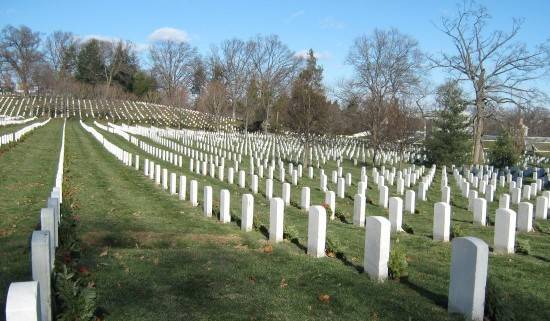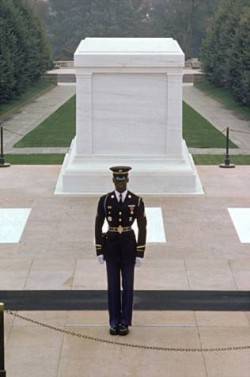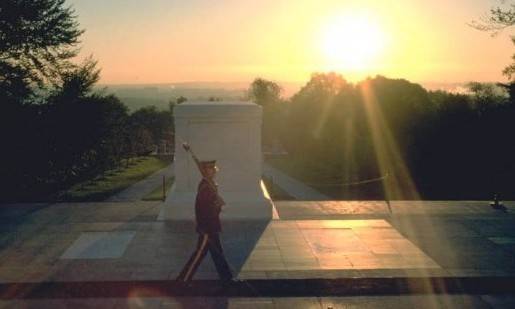Perhaps it is because I identify as Quaker. Or, perhaps it is because clean-cut military cemeteries, unlike the exotic and alluring Spanish moss-draped crypts of select cemeteries in America’s South, have never been the least bit interesting to me. Whatever the reason, until just last month, I have somehow avoided ever visiting, or raising my awareness of, our national cemetery in Arlington, Virginia.

Yet, for reasons involving crowd avoidance, hotel convenience and my son’s special obsession, my family and I ended up at Arlington over the holidays, hiking up a hill covered with orderly white government-issue tombstones in what passes for unseasonably cold weather for the DC area (in the lower 20’s). Our goal: getting to the tomb of the unknowns in time to watch the changing of the guard.
We made it just in time. Somewhere, a clock tower chimed one and the crowd instantly hushed. Off to the side, two ornately uniformed soldiers began positioning themselves.
 Everything about the changing of the guard was tightly scripted. The number of steps taken, the spoken commands, the clicking of the metal heels together, the positioning of the rifles, even the direction of the guard’s gaze at any moment in time. The mood was somber, the task at hand, guarding the tomb day and night 365 days a year, unbroken since 1937.
Everything about the changing of the guard was tightly scripted. The number of steps taken, the spoken commands, the clicking of the metal heels together, the positioning of the rifles, even the direction of the guard’s gaze at any moment in time. The mood was somber, the task at hand, guarding the tomb day and night 365 days a year, unbroken since 1937.
I later read that guarding the tomb of the unknowns, which contains the remains of soldiers from WWI, WWII and the Korean War (the Vietnam War soldier was later identified and reburied elsewhere), is one of our country’s highest military honors. Only a select few are ever chosen for this duty, which demands the ability to stand unflinching for hours in even the foulest weather.
After the ceremony, my kids had lots of questions, the two most pressing being, “Why does a soldier stand in front of the tomb 24/7?” and “What is an unknown soldier?”
There are no tightly controlled scripts in our family for answering these kinds of questions. No Disney-fied pat answers, no formulas oozing patriotism or God. Really, one of the benefits of having kids is that they force you to verbalize, and thus acknowledge, some of your own most ambiguous, complex and difficult issues.
“There is a guard there so that the unknown soldier is never alone and never feels forgotten,” I say off the cuff. “If even one person remembers, then they will never be forgotten, no matter what happens.” I’m not sure this is a good answer, but everyone seems satisfied.
Then, “An unknown soldier is a person that can’t be identified after death. Because something horrible happened to them, and there are only pieces left.” “You mean, like a body without a head?” “Yep,” I say. Silence.
My youngest son is obsessed with history, the history of war, to be more precise. He knows the make and model number of almost every World War II combat plane, US or enemy. We used to joke about him being the only Quaker kid in Illinois with a hidden arsenal of war toys under his bed. Now, we are beginning to understand that his obsessions, and other strange behaviors, have probably more to do with Asperger’s Syndrome than with mere eccentricity. And, in our uniquely dysfunctional way, our family is coping by jumping full-force into his world. We’ve visited the Air Force museum in Dayton, Ohio, we’ve paid big bucks for open cockpit airplane rides, we’ve almost bought plane tickets to Hawaii so that my son could visit the memorial to the USS Arizona, a warship sunk in the attack on Pearl Harbor. That impulse was, luckily for our credit records, quickly squelched.
And here we were: standing on top of a wind-swept hill in below-freezing weather, the history of war reflecting so brightly from the marble tombstones that the guards have to wear dark shades to protect their eyes. From here, we will go to Mount Vernon and discover the centrality of war to the making of the first president himself, the father of our country, for whom the city laid out in front of us is named. Washington D.C.: city of white marble.

Walking back down the hill, the kids play at clicking their heels together, and I think about how quickly the crowd dissipated after the ceremony was over. It was the guards they came to see, of course, not the tomb itself. It is ceremony that gives us welcome reprieve from the reality of death and destruction. As if the tightly controlled movements and exaggerated rituals of the guards could somehow shield us from the reality that our very American existence is founded on the most inhumane of human activities: war.
At Mt. Vernon, my son is intensely focused on his toy airplane of the day, a P40 Mustang, a long-range WWII fighter. He holds it like a dart in his hand and flies it across what used to be Washington’s bowling green. This rehearsed and repetitive play helps him create a safe zone during times of sensory overload. We try to pull him toward the restored slave quarters. We want to tell him that Washington freed his slaves in his will. But my son can’t hear us. He is upset that the plane’s plastic propeller is slightly bent. He drops to the ground in a fit and throws off his thick glasses and we scurry to retrieve them before they get stepped on.
Tourists stop and stare. My son is getting older, bigger, and I suppose most 10-year-olds don’t throw tantrums, especially not on the lawn in front of one of our nation’s holiest historical sites. We offer him chocolate and he calms down. We know to keep chocolate on hand at all times now.
Really, all he wants is control over the uncontrollable. And I can’t blame him. We all do. Because when you think about it, in many ways, we are an Asperger’s nation. A country that obstinately continues to demand a kind of perfection and order: warplanes lined up on aircraft carriers, soldiers in straight lines marching into basic training, pressed and polished uniforms, firearms that feel just right in our hands. To consider anything else would be to risk failure and defeat. It would be like opening the tomb and finding ragged and torn pieces of our selves strangely inside.








